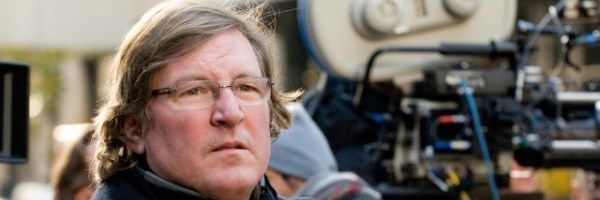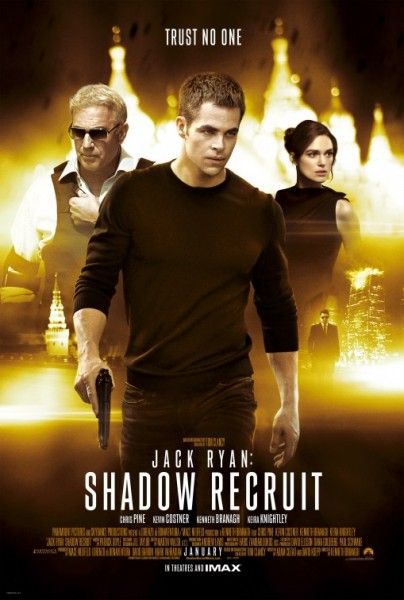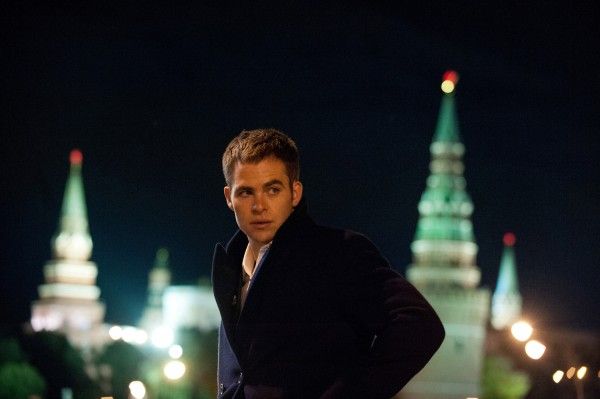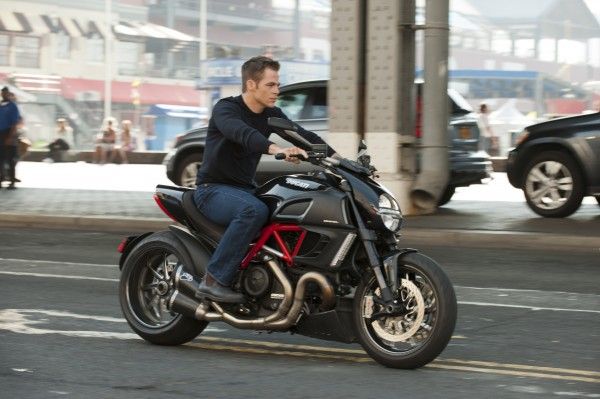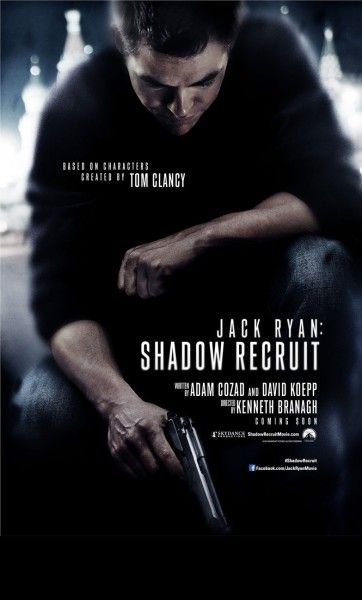As I’ve said many times, while it’s always great to talk to actors, if you really want to find out why certain decisions were made on a film, you always want to talk to the director and the producers. In the case of Jack Ryan: Shadow Recruit, the set of which I visited in 2012, the one who provided a ton of information was Lorenzo di Bonaventura (who also produced the Transformers franchise, Red, Red 2, Salt, The Last Stand, Side Effects, G.I. Joe, and many more).
During an extended group interview on set, di Bonaventura talked about the challenge of rebooting the franchise, why they chose Kenneth Branagh and Chris Pine, how Jack Ryan is a contemporary film that addresses the economic uncertainty and fears in a post-9/11 world, why the film takes place in Moscow and the reasons for filming in London, the action sequences, the kind of villain Branagh plays, and so much more. Hit the jump to check it out.
Question: What was the challenge of bringing this property to the screen like?
DI BONAVENTURA: The first challenge has been that [producer] Mace [Neufeld] put together this great series of films that really stand up: their intelligence; their entertainment value. So he set a pretty high bar. That, in and of itself, was the biggest challenge. We didn’t want to screw up, after all of those good films.
I think the big break for us really came when Ken [Branagh] came aboard. He has such a great vision. It’s very interesting to watch him work because he’s such an actor’s director. At the same time, with Thor, he had the chance to play in a big arena, so he has put those two things together here. It’s a lot about performance. There’s a lot of emotional context that’s going on between Jack and his fiancée. And Jack, as a character, is going through this decision-making process. This is really the origin story. The result of it is that you see a guy who doesn’t view the CIA with rose-colored glasses, that’s for sure, debating the merit of becoming part of a government organization. And it really becomes, “What can I do? What can’t I do?”
It was really important for us to have a director who could get that emotional context going. Jack’s also a guy, because of the line of work that he is in, he has not told everything to his fiancée, and that has been building in their relationship. There’s a great pressure cooker going on, which adds to … it’s hard enough having a relationship, you know? If you are hiding a part of it, it adds a real complication. We can make these great, roller-coaster action sequences, because [Branagh’s] had those experiences, but you can do… When I think of the Jack Ryan movies, there was always one kind of marquee moment where you are really like, “Whoa! That was fucking cool.” And that’s one of the things that e have to do in this one.
Jack Ryan really does have a long legacy. What do you think it is that makes him such an iconic character? Probably everybody has a slightly different point of view on it. For me, the thing I see most of all is that he’s an everyman. “Everyman” is probably even the wrong word. He’s living in an extraordinary place, and his education certainly isn’t every-man. When you’re watching a Jack Ryan movie, though, you feel like you could be in the same place, and you’d hope that you do the same thing. He’s not Jason Bourne. He can’t take out 10 guys with one hand tied behind his back. Which is fun as hell. I think that’s what makes Jack approachable. He has a strong sense of right and wrong. Those are the two things I always related to with him. That’s what Clancy came up with.
I always believe, with any kind of hero, that you want to believe that their decision-making is right. That ultimately, I can trust what that guy’s sense of right and wrong will be. Even in a vigilante movie, where you are going against the law by definition, you still want to agree with the fact that your character is breaking the law. That’s the same thing with Jack. Here’s a guy with a clear sense of right and wrong, but because we are doing the young Jack Ryan, there is some sort of formation going on, of what the definition of that is.
There has only been one Jack Ryan movie since 9/11. Does this Jack Ryan get back into a pre-9/11 type world?
DI BONAVENTURA: No, I think this is incredibly contemporary. The thing I always liked about [Clancy]—I was thinking about Clear and Present Danger the other day, and that movie felt like it existed in that moment. Pablo Escobar – that’s what it felt like our world was facing at that time, right?
Our world right now faces incredible economic uncertainty. The notion of what is a super power has evolved, and who actually can carry what muscle [has changed]. What is America’s role in the world? All of those things exist in this movie. It feels incredibly contemporary, particularly the economic aspect of it. A lot of the larger, earthquake moves that precipitate this movie have to do with the fact of what is the economic order, and who is trying to take control over it. It’s not a movie about economics, but the effect of what is going on in the world is very drive, and very clear in this movie.
Can you give us a better idea of the story, or tell us why we’re in London?
DI BONAVENTURA: [Laughs] Our director’s from London. No, um, I think on every movie, you’re always in the wrong city. Unless your story is set in that city. We debated a number of cities, and interestingly enough, Liverpool and London can double for New York and Moscow. [Laughs] I never would have known it. That’s why we’re here. Seriously, though, the villain of the piece is a man who has great wealth and great power, and would have a building just like this building. The financial district [in London] is very important to our decision to being here. We’re trying to communicate the idea of unrestrained wealth, and the power that comes along with it. That building also looks like the Death Star.
Without divulging too much about the plot, the story is about Jack’s decision-making process to become part of the world with which we are familiar with him. He gets caught up—actually, 9/11 is a direct motivator for him. I think in a way this might be the first post-9/11 spy movie, because it so directly motivates its hero. Jack is a character who reacts to 9/11 be going into the service. What’s fun about that is it allows you to go back into all the back story of what Clancy wrote, and put it into context.
Do you view this story as setting up reboots of The Hunt for Red October or Clear and Present Danger?
DI BONAVENTURA: I never thought about that, but…it’s a good thought. [Laughs]
Well, do those stories exist in the universe that you are setting up, or is this a new Jack Ryan universe separated from the books?
DI BONAVENTURA: First, Hunt for Red October is one of my favorite films, so the idea of trying to redo that is, just, I don’t know. That’s an honest answer. All of them have a very specific political moment in time. I suppose you could do a Clear and Present Danger associated with Mexico pretty easily right now, couldn’t you? I haven’t really thought about it, honestly. We’ve just been so focused on making this movie work. A lot o them also play with the Soviet Union, and that… I don’t think you want to make a period version of this character. But I can’t rule it out.
Do you bristle at the term reboot, or is that an accurate description?
DI BONAVENTURA: I understand why people are saying that’s what it is, but Chris Pine is so different than Harrison [Ford] and Alec [Baldwin]. It is Jack Ryan in the sense that he’s the every man, the sense of intelligence, the sense of physical capabilities without being Superman. I guess in that sense it’s a reboot in that we recognize all of those things. But Chris is so different and has a very different color as a result of that.
What made you choose Chris for the role?
DI BONAVENTURA: It was actually Paramount’s idea. After Star Trek, they had the advantage of seeing all the dailies we had not seen. So they started calling Mace and I and saying, “What about Chris?” He’s an amazing actor. And it’s great to have that ability. As a person in real life, he’s a very thoughtful guy. He’s great or Jack Ryan, because you can really feel the wheels turning, and there’s really something in the wheels. I think that’s one of my favorite things about Jack Ryan. He’s always the guy in the room who’s not afraid to say the thing that everyone else is either thinking or is too afraid to say. He’s the one who’ll raise his hand and say, “You know, I’m not so sure.” I think Chris is that sort of person. He’s handsome, but as an individual, he’s got a big brain and it’s great for the character.
You mentioned the roller-coaster action. What can you tell us about that in this film?
DI BONAVENTURA: Well, I always looked at these movies as half action, half thriller. We’ve stayed to that notion. Someone is directly in jeopardy. As you know, I have nothing against explosions, but [characters] are not running through fields of explosions. The hardest thing to do about this type of action is that you have to feel like you’re utterly in the guy’s shoes, or it doesn’t work. It’s so much about the emotional state. It’s not about the whiz-bang of it. You want to do the whiz-bang, but you can’t do it without being solidly inside the character. That makes it personal and emotional, which is different from other action movies.
This isn’t adapted from a specific Clancy book. How have you been going about compiling information without a specific book to reference?
DI BONAVENTURA: We have been going over every novel, gleaning every bit of back-story information that we could. And we put every bit in. In a funny way, more than any of the other movies, we were relying on… because they all had very good plots and specific character agendas. Because we didn’t have that, we were able to take all of the ideas and then design a movie around all of the backstory as opposed to a specific part of it. So if you’re a Clancy fan, you’re going to go, “Oh my God, that? Do you remember that?” We’re able to do all that because the movie has been designed around the origin as opposed to the character being part of the plot.
You mentioned Chris Pine’s role in Star Trek. Will it ever be viewed as a complication that he’s also Capt. Kirk?
DI BONAVENTURA: I think it could be a complication in certain circumstances, but again, they are so different. This is so “present day” and that is so “futuristic” that I don’t think we’ll have that problem. I think trying to be another spy might not be the best thing. He’s not the best choice to play Jason Bourne in a reboot. But I think the audience, in general, is relating to familiarity, so I think it serves somebody to have someone who the audience has invested a lot. We benefit because people have invested in him as Kirk.
Where does Kevin Costner’s character fit into all of this?
DI BONAVENTURA: He’s not that traditional character of mentor. He’s a guy of action, too. He’s a field agent. He’s a little more senior. He carries more experience. But we’ve seen a lot of movies with the older mentor and the younger agent, and this movie doesn’t do that. He’s in the field with Jack. When things go wrong, he gets thrust into the middle. It creates a different relationship between the two men. It’s also the movie where they are meeting. He couldn’t be a mentor because they first meet. It’s first movie where they get a sense that they are working together, and there’s a relationship tied to, “What are we going to do here?” And Kevin, carrying all of the heroism that he has done in his career often, the mentor character feels like the armchair guy. Kevin can’t feel that way. We put him out in the field so that he’s not sitting in the armchair. He’s just not that guy. We also get two generations of stars, as a result. Kevin’s choices in an action scene are different from Chris’, but they’re both valid and it gives the movie a lot of energy. You don’t have to sit in a room and have a nice conversation scene, we’re on the fly and shit’s happening and we’re in trouble.
You said it’s a half thriller, half action-adventure…
DI BONAVENTURA: Well I think the action, when you look at it that way, it drives a lot from suspense.
I’m wondering how much romance is involved.
DI BONAVENTURA: Keira is doing an American accent in this and she’s doing it phenomenally well, and she and Chris make a very greatly balanced couple. As I was saying about Chris, Keira is also incredibly intelligent and her character is someone who has succeeded far enough within the medical world to become an eye doctor, so they really are peers in a way. And you’re watching that, they’re not married but you’re also not seeing the boyfriend/girlfriend in the way we often see it—they really are peers, they really are trying to find their way in their worlds, and there’s friction in that. One person has professional aspirations and one person’s not telling the truth about everything.
Is this their origin story as well?
DI BONAVENTURA: It’s the first time you’ll see it onscreen. There is some backstory to it, but they’re not married yet.
But we don’t see them meet?
DI BONAVENTURA: In the backstory you’ll see it briefly. So I guess in that sense it’s a pure origin story.
Earlier you mentioned how there was such a Soviet influence in the previous films, I’m curious having Russia be a part of this film, how that developed.
DI BONAVENTURA: Putin helps us every week (laughs). He’s on our payroll and we ask him to do some really tough, Russian things and so far he’s been very helpful (laughter). I don’t know if you’ve been to Moscow, but when you go to Moscow it hasn’t really decided what it is. I understand we see the news and we see on perspective, but when you go there your experience of it is it doesn’t feel entirely safe. It’s not a place where you would wanna be out there on your own and have people be upset at you. It’s not to say it’s a bad thing, it’s just that’s the way you feel of it, it feels like it’s not an entirely safe place to be if you’re not towing the line—and Jack’s not a character that’s ever been good at towing the line.
Do you touch on the old world Communist sympathizers?
DI BONAVENTURA: No, we’re in modern Russia.
Is there a learning curve that’s gonna have to occur for people who haven’t seen any Jack Ryan films?
DI BONAVENTURA: Well you hope that if you don’t know Jack Ryan it won’t matter. We designed it in a way where—at least we think we have—you meet Jack as a young guy and watch him come to fruition. I think if you don’t have any experience with Jack you’ll have one experience with the movie, if you do you’ll see the movie similarly but maybe it’ll be imbued with an extra something. But it’s definitely not dependent on knowing the other movies.
But you’re still selling it using the name Jack Ryan.
DI BONAVENTURA: It’s a great character, I think it is. The films preceding this did a really great job of setting up a great character, and that’s what we’re going after.
When did Moscow become the central location for the film?
DI BONAVENTURA: It actually started as Dubai as a script and then switched to Moscow three or four years ago. But what Dubai had, in our opinion, was the same thing where you feel a little bit like a stranger in a strange land. When you run out in that street and the authorities are after you, you’re not feeling entirely comfortable or safe.
Was the villain character also originally from Dubai?
DI BONAVENTURA: Yes.
Why the change?
DI BONAVENTURA: The original script, I think, started feeling a little bit dependent on Islamic anger; it trapped itself a little bit. It was great because it was fresh because you were in a civilized city with a lot of money and a lot of things, and at the same time an implacable kind of foe.
For more from my Jack Ryan: Shadow Recruit set visit:
- 40 Things to Know About JACK RYAN: SHADOW RECRUIT From Our Set Visit; Plus Video Blog Recap
- Chris Pine Talks Drawing from the Previous Films, Working with Kenneth Branagh, and More on the Set of JACK RYAN: SHADOW RECRUIT
- Kevin Costner Talks Turning Down HUNT FOR RED OCTOBER, His Career and Directorial Process, TV, and More on the Set of JACK RYAN: SHADOW RECRUIT
- Director Kenneth Branagh Talks Setting the Film Apart from Other Action-Thrillers, Playing the Villain, and More on the Set of JACK RYAN: SHADOW RECRUIT
- Producers David Barron and Mace Neufeld Talk Rebooting the Franchise, Casting Chris Pine, and More on the Set of JACK RYAN: SHADOW RECRUIT

